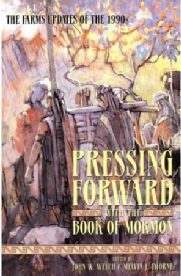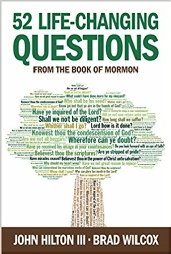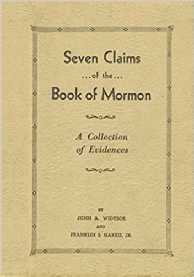Book of Mormon Feast








We are a participant in the Amazon Services LLC Associates Program, an affiliate advertising program designed to provide a means for us to earn fees by linking to Amazon.com and affiliated sites.
A Library Tour through Mosiah 12-15
Mosiah 12
1. And it came to pass that after the space of two years that Abinadi came among
them in disguise, that they knew him not, and began to prophesy among them, saying:
Thus has the Lord commanded me, saying -
2. Yea, wo be unto this generation! And the Lord said unto me: Stretch forth thy hand and prophesy saying: Thus saith the Lord, it shall come to pass that this generation, because of their iniquities, shall be brought into bondage, and shall be smitten on the cheek; yea, and shall be driven by men, and shall be slain; and the vultures of the air, and the dogs, yea, and the wild beasts, shall devour their flesh.
3. And it shall come to pass that the life of king Noah shall be valued even as a garment in a hot furnace; for he shall know that I am the Lord.
Pressing Forward with the Book of Mormon: The FARMS Updates of the 1990s. Edited by John W. Welch & Melvin J. Thorne.
Chapter 30 – As a Garment in a Hot Furnace. Research by John A. Tvedtnes, originally
published in the Journal of Book of Mormon Studies 6/1 (1997): 76-
This is an interesting examination of scriptural references to destroying/burning
unwholesome garments, fire, and furnaces, in light of Abinadi’s simile curse prophesy.
4. And it shall come to pass that I will smite this my people with sore afflictions, yea, with famine and with pestilence; and I will cause that they shall howl all the day long.
5. Yea, and I will cause that they shall have burdens lashed upon their backs; and they shall be driven before like a dumb ass.
6. And it shall come to pass that I will send forth hail among them, and it shall smite them; and they shall also be smitten with the east wind; and insects shall pester their land also, and devour their grain.
7. And they shall be smitten with a great pestilence -
8. And it shall come to pass that except they repent I will utterly destroy them from off the face of the earth; yet they shall leave a record behind them, and I will preserve them for other nations which shall possess the land; yea, even this will I do that I may discover the abominations of this people to other nations. And many things did Abinadi prophesy against this people.
9. And it came to pass that they were angry with him; and they took him and carried him bound before the king, and said unto the king: Behold, we have brought a man before thee who has prophesied evil concerning thy people, and saith that God will destroy them.
10. And he also prophesieth evil concerning thy life, and saith that thy life shall be as a garment in a furnace of fire.
11. And again, he saith that thou shalt be as a stalk, even as a dry stalk of the field, which is run over by the beasts and trodden under foot.
12. And again, he saith thou shalt be as the blossoms of a thistle, which, when it is fully ripe, if the wind bloweth, it is driven forth upon the face of the land. And he pretendeth the Lord hath spoken it. And he saith all this shall come upon thee except thou repent, and this because of thine iniquities.
13. And now, O king, what great evil hast thou done, or what great sins have thy people committed, that we should be condemned of God or judged of this man?
14. And now, O king, behold, we are guiltless, and thou, O king, hast not sinned; therefore, this man has lied concerning you, and he has prophesied in vain.
15. And behold, we are strong, we shall not come into bondage, or be taken captive by our enemies; yea, and thou hast prospered in the land, and thou shalt also prosper.
16. Behold, here is the man, we deliver him into thy hands; thou mayest do with him as seemeth thee good.
17. And it came to pass that king Noah caused that Abinadi should be cast into prison; and he commanded that the priests should gather themselves together that he might hold a council with them what he should do with him.
18. And it came to pass that they said unto the king: Bring him hither that we may question him; and the king commanded that he should be brought before them.
19. And they began to question him, that they might cross him, that thereby they might have wherewith to accuse him; but he answered them boldly, and withstood all their questions, yea, to their astonishment; for he did withstand them in all their questions, and did confound them in all their words.
20. And it came to pass that one of them said unto him: What meaneth the words which are written, and which have been taught by our fathers, saying:
21. How beautiful upon the mountains are the feet of him that bringeth good tidings; that publisheth peace; that bringeth good tidings of good; that publisheth salvation; that saith unto Zion, Thy God reigneth;
22. Thy watchmen shall lift up the voice; with the voice together shall they sing; for they shall see eye to eye when the Lord shall bring again Zion;
23. Break forth into joy; sing together ye waste places of Jerusalem; for the Lord hath comforted his people, he hath redeemed Jerusalem;
24. The Lord hath made bare his holy arm in the eyes of all the nations, and all the ends of the earth shall see the salvation of our God?
25. And now Abinadi said unto them: Are you priests, and pretend to teach this people, and to understand the spirit of prophesying, and yet desire to know of me what these things mean?
26. I say unto you, wo be unto you for perverting the ways of the Lord! For if ye understand these things ye have not taught them; therefore, ye have perverted the ways of the Lord.
27. Ye have not applied your hearts to understanding; therefore, ye have not been wise. Therefore, what teach ye this people?
52 Life-
John Hilton III & Brad Wilcox
Quoted from the book:
[excerpt from] Question #25: What teach ye this people?
Few members of The Church of Jesus Christ of Latter-
It is interesting to know that Brother Russell wasn’t always a Church member with a passion for family history. Harry Russell was born in 1869 in Wyoming, where his father was a frontier doctor. As Harry grew he was sent to live with relatives in Iowa and Ohio in order to obtain a proper education and training to become a pharmacist. In 1881, when he received word of his father’s death, Harry determined to return to the West and help care for his mother. They settled in Conejos, Colorado, where Harry established a pharmacy and was one of the most highly educated men in town.
It was there he met and married a member of the Church named Dollie. Together they were responsible for bringing the telephone and electricity to their small community. When missionaries traveled through the area, Dollie fed them, but Harry felt sorry for these “ignorant” men who had been so “deceived” that they actually accepted something as “fraudulent” as the Book of Mormon. Harry finally determined to read the book in an effort to disprove it. Instead, his own intellectual honesty forced him to accept the truth of what he read. Harry finally allowed his children to be baptized, but he could not join himself because he smoked. This did not stop the local bishop from extending a calling to him to teach Sunday School.
Harry was thrilled at this opportunity to show off his eastern education and introduce the members, many of whom were not well educated, to some of the great thinkers, writers, and philosophers of the world. Abinadi may not have been happy with Harry’s answer to the question, “What teach ye this people?” Likewise, his bishop told him, “You must teach only Church doctrine. You must teach from the scriptures. You must teach the principles and ordinances of the gospel and the life, mission, and Atonement of the Savior.”
Harry was deflated, but he was obedient. He taught Church doctrine, and as he did so, he taught not only his students but also himself. On July 7, 1912, Harry was baptized. He had always been a heavy smoker who rolled his own cigarettes from a pouch of Bull Durham tobacco. To his wife’s dismay, he smoked right up until midnight before the day of his baptism. Then he never smoked again. When he was tempted, he would look at the little sack of tobacco and say, “who is stronger – you or me?” Harry lived the Word of Wisdom throughout the rest of his life and was undeviating in his commitment to live all the principles of the gospel.
Such is the power of true doctrine. Harry altered his beliefs, broke a lifelong habit, and changed his entire life. This transformation was not because of the great thinkers, writers, and philosophers of the world. He had read and studied their words from his youth, but they did not motivate significant life changes in Harry. It was true doctrine – the teachings of Jesus Christ – that led him to God and made all the difference. . . .
Like Brother Russell, we can teach true doctrine. We can also invite those we teach to make changes in their lives. Our objective as gospel teachers is not to teach content alone; it is to help our students change their lives. President Thomas S. Monson said, “The goal of gospel teaching . . . is not to “pour information” into the minds of class members. . . . The aim is to inspire the individual to think about, feel about, and then do something about living gospel principles.”
Preach My Gospel . . . states, “Rarely, if ever, should you talk to people or teach them without extending an invitation to do something that will strengthen their faith in Christ. . . . People will not likely change unless they are invited to do so . . . Extending an invitation without following up is like beginning a journey without finishing it or buying a ticket to a concert without going into the theater. Without the completed action, the commitment is hollow.”. . .
Sunday School general president Russell T. Osguthorpe taught, “Learning for conversion is a continual process of knowing, doing, and becoming. Likewise, teaching for conversion requires key doctrine, invitations to action, and promised blessings. When we teach true doctrine, we help the learner to know. When we invite others to action, we help them to do or live the doctrine. And when the blessings come that the Lord has promised, we are changed.”
28. And they said: We teach the law of Moses.
29. And again he said unto them: If ye teach the law of Moses why do ye not keep it? Why do ye set your hearts upon riches? Why do ye commit whoredoms and spend your strength with harlots, yea, and cause this people to commit sin, that the Lord has cause to send me to prophesy against this people, yea, even a great evil against this people?
30. Know ye not that I speak the truth? Yea, ye know that I speak the truth; and you ought to tremble before God.
31. And it shall come to pass that ye shall be smitten for your iniquities, for ye have said that ye teach the law of Moses. And what know ye concerning the law of Moses? Doth salvation come by the law of Moses? What say ye?
32. And they answered and said that salvation did come by the law of Moses.
33. But now Abinadi said unto them: I know if ye keep the commandments of God ye shall be saved; yea, if ye keep the commandments which the Lord delivered unto Moses in the mount of Sinai, saying:
Seven Claims of the Book of Mormon: A Collection of Evidences.
John A. Widstoe and Franklin S. Harris, Jr.
Claim Two: The Book of Mormon was written on gold plates in Reformed Egyptian by a succession of historians.
Writing on gold plates was one of the first Book of Mormon facts that received great ridicule, so Elder Widstoe documents a number of mentions of records kept on metal plates throughout the world, the weight of the plates, the capacity of the plates, and the original language of the Book of Mormon. He points out differences in the writings of the various recorders.
He speaks of the English in which the book was translated, citing several instances of Hebraisms, such as “Mount of Sinai,” a phrase not found in the King James Bible. (Many more Hebraisms have been noted in the intervening years). He has an extensive list of vocabulary and ideas common to frontier America that would have no place in a book of an ancient Hebrew civilization, and these are, in fact, totally lacking in the Book of Mormon.
The author lists the terminations of Nephite names, then for every termination except 2, he lists Bible names with those same terminations. Finally he writes of two examples where Nephi’s brass plates version of Isaiah is more accurate and more clear, and other supporting documents have been found which validate the brass plates reading over the Authorized Version (AV = King James Bible).
34. I am the Lord thy God, who hath brought thee out of the land of Egypt, out of the house of bondage.
35. Thou shalt have no other God before me.
36. Thou shalt not make unto thee any graven image, or any likeness of any thing in heaven above, or things which are in the earth beneath.
37. Now Abinadi said unto them, Have ye done all this? I say unto you, Nay, ye have not. And have ye taught this people that they should do all these things? I say unto you, Nay, ye have not.
Mosiah 13
1. And now when the king had heard these words, he said unto his priests: Away with this fellow, and slay him; for what have we to do with him, for he is mad.
2. And they stood forth and attempted to lay their hands on him; but he withstood them, and said unto them:
3. Touch me not, for God shall smite you if ye lay your hands upon me, for I have not delivered the message which the Lord sent me to deliver; neither have I told you that which ye requested that I should tell; therefore, God will not suffer that I shall be destroyed at this time.
4. But I must fulfil the commandments wherewith God has commanded me; and because I have told you the truth ye are angry with me. And again, because I have spoken the word of God ye have judged me that I am mad.
5. Now it came to pass after Abinadi had spoken these words that the people of king Noah durst not lay their hands on him, for the Spirit of the Lord was upon him; and his face shone with exceeding luster, even as Moses' did while in the mount of Sinai, while speaking with the Lord.
6. And he spake with power and authority from God; and he continued his words, saying:
7. Ye see that ye have not power to slay me, therefore I finish my message. Yea, and I perceive that it cuts you to your hearts because I tell you the truth concerning your iniquities.
8. Yea, and my words fill you with wonder and amazement, and with anger.
9. But I finish my message; and then it matters not whither I go, if it so be that I am saved.
10. But this much I tell you, what you do with me, after this, shall be as a type and a shadow of things which are to come.
11. And now I read unto you the remainder of the commandments of God, for I perceive that they are not written in your hearts; I perceive that ye have studied and taught iniquity the most part of your lives.
12. And now, ye remember that I said unto you: Thou shall not make unto thee any graven image, or any likeness of things which are in heaven above, or which are in the earth beneath, or which are in the water under the earth.
13. And again: Thou shalt not bow down thyself unto them, nor serve them; for I the Lord thy God am a jealous God, visiting the iniquities of the fathers upon the children, unto the third and fourth generations of them that hate me;
14. And showing mercy unto thousands of them that love me and keep my commandments.
15. Thou shalt not take the name of the Lord thy God in vain; for the Lord will not hold him guiltless that taketh his name in vain.
16. Remember the sabbath day, to keep it holy.
17. Six days shalt thou labor, and do all thy work;
18. But the seventh day, the sabbath of the Lord thy God, thou shalt not do any work,
thou, nor thy son, nor thy daughter, thy man-
19. For in six days the Lord made heaven and earth, and the sea, and all that in them is; wherefore the Lord blessed the sabbath day, and hallowed it.
20. Honor thy father and thy mother, that thy days may be long upon the land which the Lord thy God giveth thee.
21. Thou shalt not kill.
22. Thou shalt not commit adultery. Thou shalt not steal.
23. Thou shalt not bear false witness against thy neighbor.
24. Thou shalt not covet thy neighbor's house, thou shalt not covet thy neighbor's
wife, nor his man-
25. And it came to pass that after Abinadi had made an end of these sayings that he said unto them: Have ye taught this people that they should observe to do all these things for to keep these commandments?
26. I say unto you, Nay; for if ye had, the Lord would not have caused me to come forth and to prophesy evil concerning this people.
27. And now ye have said that salvation cometh by the law of Moses. I say unto you that it is expedient that ye should keep the law of Moses as yet; but I say unto you, that the time shall come when it shall no more be expedient to keep the law of Moses.
28. And moreover, I say unto you, that salvation doth not come by the law alone; and were it not for the atonement, which God himself shall make for the sins and iniquities of his people, that they must unavoidably perish, notwithstanding the law of Moses.
29. And now I say unto you that it was expedient that there should be a law given to the children of Israel, yea, even a very strict law; for they were a stiffnecked people, quick to do iniquity, and slow to remember the Lord their God;
30. Therefore there was a law given them, yea, a law of performances and of ordinances, a law which they were to observe strictly from day to day, to keep them in remembrance of God and their duty towards him.
31. But behold, I say unto you, that all these things were types of things to come.
32. And now, did they understand the law? I say unto you, Nay, they did not all understand the law; and this because of the hardness of their hearts; for they understood not that there could not any man be saved except it were through the redemption of God.
33. For behold, did not Moses prophesy unto them concerning the coming of the Messiah,
and that God should redeem his people? Yea, and even all the prophets who have prophesied
ever since the world began -
34. Have they not said that God himself should come down among the children of men, and take upon him the form of man, and go forth in mighty power upon the face of the earth?
35. Yea, and have they not said also that he should bring to pass the resurrection of the dead, and that he, himself, should be oppressed and afflicted?
Mosiah 14
1. Yea, even doth not Isaiah say: Who hath believed our report, and to whom is the arm of the Lord revealed?
2. For he shall grow up before him as a tender plant, and as a root out of dry ground; he hath no form nor comeliness; and when we shall see him there is no beauty that we should desire him.
3. He is despised and rejected of men; a man of sorrows, and acquainted with grief; and we hid as it were our faces from him; he was despised, and we esteemed him not.
4. Surely he has borne our griefs, and carried our sorrows; yet we did esteem him stricken, smitten of God, and afflicted.
5. But he was wounded for our transgressions, he was bruised for our iniquities; the chastisement of our peace was upon him; and with his stripes we are healed.
6. All we, like sheep, have gone astray; we have turned every one to his own way; and the Lord hath laid on him the iniquities of us all.
7. He was oppressed, and he was afflicted, yet he opened not his mouth; he is brought as a lamb to the slaughter, and as a sheep before her shearers is dumb so he opened not his mouth.
8. He was taken from prison and from judgment; and who shall declare his generation? For he was cut off out of the land of the living; for the transgressions of my people was he stricken.
9. And he made his grave with the wicked, and with the rich in his death; because he had done no evil, neither was any deceit in his mouth.
10. Yet it pleased the Lord to bruise him; he hath put him to grief; when thou shalt make his soul an offering for sin he shall see his seed, he shall prolong his days, and the pleasure of the Lord shall prosper in his hand.
11. He shall see the travail of his soul, and shall be satisfied; by his knowledge shall my righteous servant justify many; for he shall bear their iniquities.
12. Therefore will I divide him a portion with the great, and he shall divide the spoil with the strong; because he hath poured out his soul unto death; and he was numbered with the transgressors; and he bore the sins of many, and made intercession for the transgressors.
Mosiah 15
1. And now Abinadi said unto them: I would that ye should understand that God himself shall come down among the children of men, and shall redeem his people.
2. And because he dwelleth in flesh he shall be called the Son of God, and having
subjected the flesh to the will of the Father, being the Father and the Son -
3. The Father, because he was conceived by the power of God; and the Son, because
of the flesh; thus becoming the Father and Son -
4. And they are one God, yea, the very Eternal Father of heaven and of earth.
5. And thus the flesh becoming subject to the Spirit, or the Son to the Father, being one God, suffereth temptation, and yieldeth not to the temptation, but suffereth himself to be mocked, and scourged, and cast out, and disowned by his people.
6. And after all this, after working many mighty miracles among the children of men, he shall be led, yea, even as Isaiah said, as a sheep before the shearer is dumb, so he opened not his mouth.
7. Yea, even so he shall be led, crucified, and slain, the flesh becoming subject even unto death, the will of the Son being swallowed up in the will of the Father.
8. And thus God breaketh the bands of death, having gained the victory over death;
giving the Son power to make intercession for the children of men -
9. Having ascended into heaven, having the bowels of mercy; being filled with compassion towards the children of men; standing betwixt them and justice; having broken the bands of death, taken upon himself their iniquity and their transgressions, having redeemed them, and satisfied the demands of justice.
10. And now I say unto you, who shall declare his generation? Behold, I say unto you, that when his soul has been made an offering for sin he shall see his seed. And now what say ye? And who shall be his seed?
11. Behold I say unto you, that whosoever has heard the words of the prophets, yea,
all the holy prophets who have prophesied concerning the coming of the Lord -
12. For these are they whose sins he has borne; these are they for whom he has died, to redeem them from their transgressions. And now, are they not his seed?
13. Yea, and are not the prophets, every one that has opened his mouth to prophesy, that has not fallen into transgression, I mean all the holy prophets ever since the world began? I say unto you that they are his seed.
14. And these are they who have published peace, who have brought good tidings of good, who have published salvation; and said unto Zion: Thy God reigneth!
15. And O how beautiful upon the mountains were their feet!
16. And again, how beautiful upon the mountains are the feet of those that are still publishing peace!
17. And again, how beautiful upon the mountains are the feet of those who shall hereafter publish peace, yea, from this time henceforth and forever!
18. And behold, I say unto you, this is not all. For O how beautiful upon the mountains are the feet of him that bringeth good tidings, that is the founder of peace, yea, even the Lord, who has redeemed his people; yea, him who has granted salvation unto his people;
19. For were it not for the redemption which he hath made for his people, which was prepared from the foundation of the world, I say unto you, were it not for this, all mankind must have perished.
20. But behold, the bands of death shall be broken, and the Son reigneth, and hath power over the dead; therefore, he bringeth to pass the resurrection of the dead.
21. And there cometh a resurrection, even a first resurrection; yea, even a resurrection
of those that have been, and who are, and who shall be, even until the resurrection
of Christ -
22. And now, the resurrection of all the prophets, and all those that have believed in their words, or all those that have kept the commandments of God, shall come forth in the first resurrection; therefore, they are the first resurrection.
23. They are raised to dwell with God who has redeemed them; thus they have eternal life through Christ, who has broken the bands of death.
24. And these are those who have part in the first resurrection; and these are they that have died before Christ came, in their ignorance, not having salvation declared unto them. And thus the Lord bringeth about the restoration of these; and they have a part in the first resurrection, or have eternal life, being redeemed by the Lord.
25. And little children also have eternal life.
26. But behold, and fear, and tremble before God, for ye ought to tremble; for the Lord redeemeth none such that rebel against him and die in their sins; yea, even all those that have perished in their sins ever since the world began, that have wilfully rebelled against God, that have known the commandments of God, and would not keep them; these are they that have no part in the first resurrection.
27. Therefore ought ye not to tremble? For salvation cometh to none such; for the Lord hath redeemed none such; yea, neither can the Lord redeem such; for he cannot deny himself; for he cannot deny justice when it has its claim.
28. And now I say unto you that the time shall come that the salvation of the Lord shall be declared to every nation, kindred, tongue, and people.
29. Yea, Lord, thy watchmen shall lift up their voice; with the voice together shall they sing; for they shall see eye to eye, when the Lord shall bring again Zion.
30. Break forth into joy, sing together, ye waste places of Jerusalem; for the Lord hath comforted his people, he hath redeemed Jerusalem.
31. The Lord hath made bare his holy arm in the eyes of all the nations; and all the ends of the earth shall see the salvation of our God.

